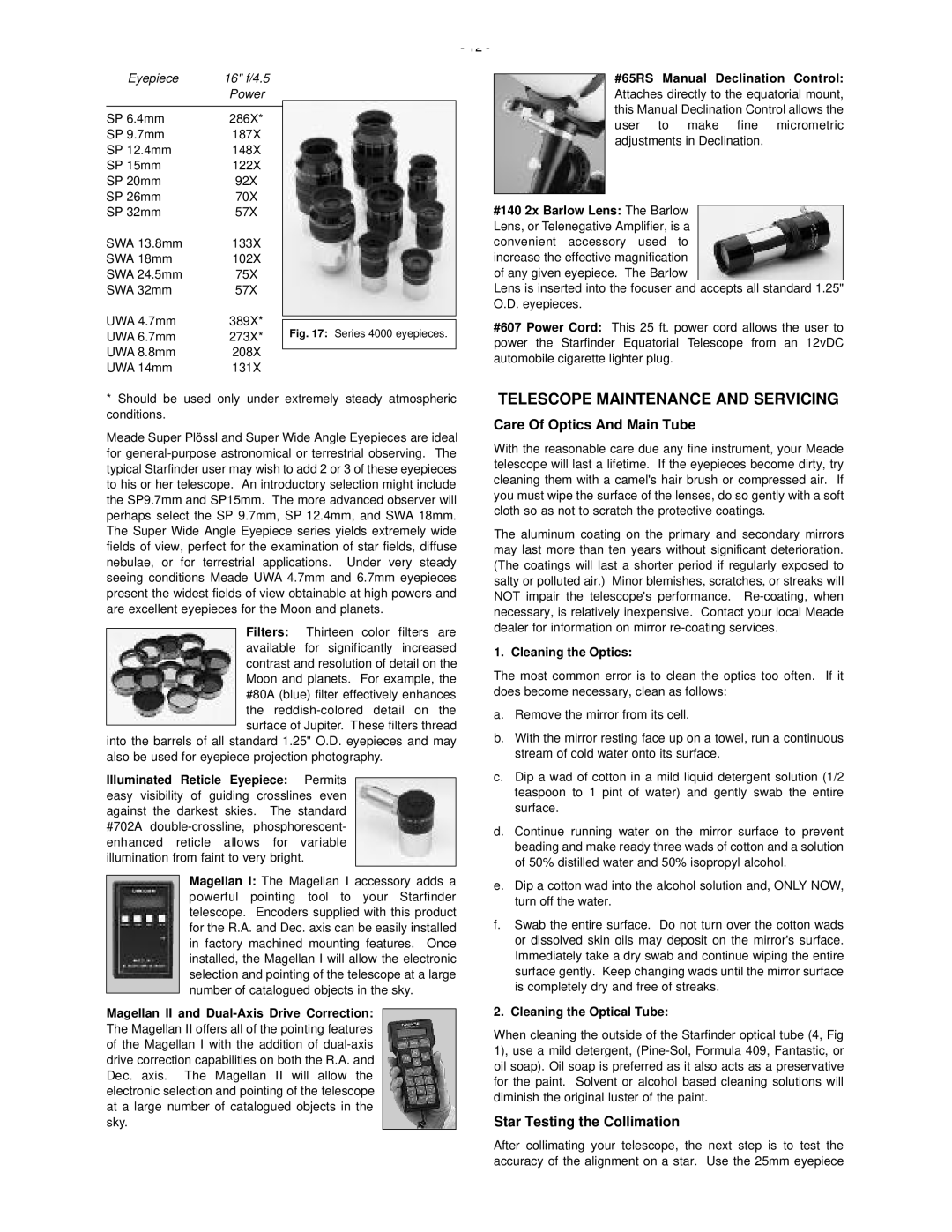
- 12 -
Eyepiece | 16" f/4.5 | |
| Power | |
|
|
|
SP 6.4mm | 286X* |
|
SP 9.7mm | 187X |
|
SP 12.4mm | 148X |
|
SP 15mm | 122X |
|
SP 20mm | 92X |
|
SP 26mm | 70X |
|
SP 32mm | 57X |
|
SWA 13.8mm | 133X |
|
SWA 18mm | 102X |
|
SWA 24.5mm | 75X |
|
SWA 32mm | 57X |
|
UWA 4.7mm | 389X* |
|
| ||
UWA 6.7mm | 273X* Fig. 17: Series 4000 eyepieces. | |
UWA 8.8mm | 208X | |
UWA 14mm | 131X | |
*Should be used only under extremely steady atmospheric conditions.
Meade Super Plössl and Super Wide Angle Eyepieces are ideal for
Filters: Thirteen color filters are available for significantly increased contrast and resolution of detail on the Moon and planets. For example, the #80A (blue) filter effectively enhances the
into the barrels of all standard 1.25" O.D. eyepieces and may also be used for eyepiece projection photography.
Illuminated Reticle Eyepiece: Permits easy visibility of guiding crosslines even against the darkest skies. The standard #702A
Magellan I: The Magellan I accessory adds a powerful pointing tool to your Starfinder telescope. Encoders supplied with this product for the R.A. and Dec. axis can be easily installed in factory machined mounting features. Once installed, the Magellan I will allow the electronic selection and pointing of the telescope at a large number of catalogued objects in the sky.
Magellan II and Dual-Axis Drive Correction:
The Magellan II offers all of the pointing features of the Magellan I with the addition of
#65RS Manual Declination Control:
Attaches directly to the equatorial mount, this Manual Declination Control allows the user to make fine micrometric adjustments in Declination.
#140 2x Barlow Lens: The Barlow Lens, or Telenegative Amplifier, is a convenient accessory used to increase the effective magnification of any given eyepiece. The Barlow
Lens is inserted into the focuser and accepts all standard 1.25" O.D. eyepieces.
#607 Power Cord: This 25 ft. power cord allows the user to power the Starfinder Equatorial Telescope from an 12vDC automobile cigarette lighter plug.
TELESCOPE MAINTENANCE AND SERVICING
Care Of Optics And Main Tube
With the reasonable care due any fine instrument, your Meade telescope will last a lifetime. If the eyepieces become dirty, try cleaning them with a camel's hair brush or compressed air. If you must wipe the surface of the lenses, do so gently with a soft cloth so as not to scratch the protective coatings.
The aluminum coating on the primary and secondary mirrors may last more than ten years without significant deterioration. (The coatings will last a shorter period if regularly exposed to salty or polluted air.) Minor blemishes, scratches, or streaks will NOT impair the telescope's performance.
1. Cleaning the Optics:
The most common error is to clean the optics too often. If it does become necessary, clean as follows:
a.Remove the mirror from its cell.
b.With the mirror resting face up on a towel, run a continuous stream of cold water onto its surface.
c.Dip a wad of cotton in a mild liquid detergent solution (1/2 teaspoon to 1 pint of water) and gently swab the entire surface.
d.Continue running water on the mirror surface to prevent beading and make ready three wads of cotton and a solution of 50% distilled water and 50% isopropyl alcohol.
e.Dip a cotton wad into the alcohol solution and, ONLY NOW, turn off the water.
f.Swab the entire surface. Do not turn over the cotton wads or dissolved skin oils may deposit on the mirror's surface. Immediately take a dry swab and continue wiping the entire surface gently. Keep changing wads until the mirror surface is completely dry and free of streaks.
2. Cleaning the Optical Tube:
When cleaning the outside of the Starfinder optical tube (4, Fig 1), use a mild detergent,
Star Testing the Collimation
After collimating your telescope, the next step is to test the accuracy of the alignment on a star. Use the 25mm eyepiece
